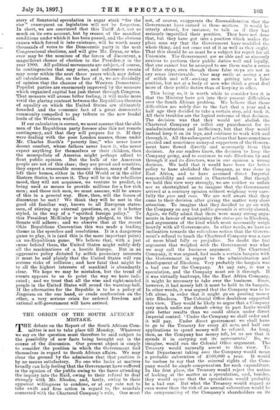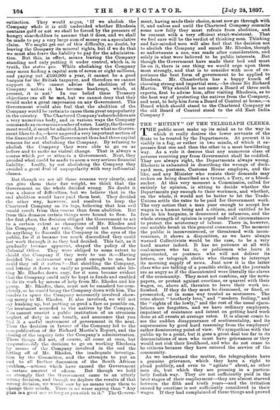THE ORIGIN OF THE SOUTH AFRICAN MISTAKE. not, of course,
exaggerate the -disconsideration that the Government have earned in these matters. It would be utterly absurd, for instance, to talk as if they had seriously imperilled their position. They have not done that, but they have got into a position which makes the plain man say that the Government have muddled the whole thing, and not come out of it as well as they ought. That this should be so must be a subject for regret for all Unionists. The Government are so able and so sincerely anxious to perform their public duties well and loyally, that one cannot but be annoyed to see them make a series of false steps, even though those false steps are not in any sense irretrievable. One may smile at seeing a set of selfish and self - seeking men getting into a false position, but not at a body of men who think a great deal more of their public duties than of keeping in office.
This being so, it is worth while to consider how it is that the Ministry have got into their present difficulties over the South African problem. We believe that those difficulties are solely due to the fact that a year and a half ago they decided to take a certain step, and took it. All their troubles are the logical outcome of that decision. The decision was that they would not abolish the Chartered Company or inflict any punishment for its maladministration and inefficiency, but that they would instead keep it on its legs, and continue to work with and through it. All the subsequent actions that have sometimes puzzled and sometimes annoyed supporters of the Govern- ment have flowed directly and necessarily from this decision. As our readers know, the decision to keep the Company going, and to continue to rule Rhodesia by and through it and its directors, was in our opinion a wrong decision. We hold that it would have been far better policy to have abolished the Company, as was done in East Africa, and to have assumed direct Imperial responsibility and control in Charterland. But though we hold this view very strongly, we are neither so unfair nor so shortsighted as to imagine that the Government arrived at a contrary opinion without weighing very care- fully the pros and cons. We are well aware that they came to their decision after giving the matter very close attention. To imagine that they decided to go on with the Company on any but public grounds is utterly absurd. Again, we fully admit that there were many strong argu- ments in favour of maintaining the status quo in Rhodesia, and arguments of the kind which must necessarily weigh heavily with all Governments. In other words, we have no inclination towards the ridiculous notion that the Govern- ment's refusal to touch the Chartered Company was a case of mere blind folly or prejudice. No doubt the first argument that weighed with the Government was what we may call the business argument. The Chartered Company, it was argued, had made a certain bargain with the Government in regard to the administration and development of Rhodesia. Very probably the bargain was a bad one for the Company. At any rate, it was a speculation, and the Company must see it through. If it was virtually bankrupt, like the East Africa Company, it might be necessary to take over the business. Since, however, it had money left it must be held to its bargain. In other words, it was argued that the Company was to be left alone, in order that it might go on pouring money into Rhodesia. The Colonial Office doubtless supported this view. They would be likely to argue that a Company very much under our thumb owing to past faults would give better results than we could obtain under direct Imperial control. 'Under the Company we shall order and. it will pay. Under direct government we shall have to go to the Treasury for every ..t5 note, and half our applications to spend money will be refused. As long, then, as the Company has money left, let us see that it spends it in carrying out its agreements.' So, we imagine, would run the Colonial Office argument. The Treasury would naturally assent to this view. To that Department taking over the Company would mean a probable subvention of £500,000 a year. It would be useless to say that the mineral rights of the Com- pany would be ample compensation for such expenditure. In the first place, the Treasury would reject the notion of looking at the matter as a. speculation, and, besides, they would opine that the speculation would probably be a bad one. But. what the Treasury would regard as even worse than the risk of an annual subvention would be the compensating of the Company's shareholders on its 'extinction. They would argue, 'if we abolish the ,Company while it is still undecided whether Rhodesia .contains gold or not we shall be forced by the pressure of hungry shareholders to assume that it does, and we shall he made to pay a very large sum of money on a speculative claim. We might get out of this difficulty, no doubt, by leaving the Oompany its mineral rights, but if we do that we must also leave the liability to pay for the administra- tion. But this, in effect, means leaving the Company standing and only putting it under control, which is, in truth, the shrills quo. While abolishing the Company may mean finding a capital sum of seven or eight millions, and paying out £600,000 a year, it cannot be a good -bargain for the British taxpayer. and therefore we cannot support it. We cannot advise the abolition of the Company unless it has become bankrupt, which, at present, it is not.' In our belief these Treasury objections can all be met, but we cannot deny that they would make a great impression on any Government. The Government would also feel that the abolition of the Company would be certain to cause them great unpopularity in the country. The Chartered Company's shareholders are a very numerous body, and in various ways the Company commands an enormous number of votes. Lastly, the Govern- ment would, it must be admitted,have done what no Govern- ment likes to do,—have angered a very important section of the financial world. The Government thus had three capital reasons for not abolishing the Company. By refusing to abolish the Company they were able to go on as before and to make no violent change. That is always a course which per se attracts a Government. Next, they avoided what could be made to seem a very serious financial liability. Lastly, by not abolishing the Company they avoided a great deal of unpopularity with very influential classes.
But though we see all these reasons very clearly, and can give them their due weight, we think that the Government on the whole decided wrong. No doubt it was a choice of difficulties, but we believe that in the end abolition would have paid them best. They decided the other way, however, and resolved to keep the Chartered Company on its legs, believing that less evil would result from this course than from abolition. But from this deoiaion certain things were bound to flow. In the first place, the decision obliged the Government to act to a certain extent as champions of Mr. Rhodes and his Company. At any rate, they could not themselves do anything to discredit the Company in the eyes of the public, for if it became too much discredited they could not work through it as they had decided. This fact, as it gradually became apparent, shaped the policy of the Colonial Office. They were obliged to some extent to shield the Company if they were to use it.—Having decided the instrument was good enough to use, how could they 2all it rotten ?—But shielding the Company, and letting it down as easily as possible, meant also let- ting Mr. Rhodes down easy, for it soon became evident that the Company could only be kept in funds and enabled to do its work by means of help from Mr. Rhodes and his group. Mr. Rhodes, then, must not be smashed too com- pletely, or he would bring the Company down with him. The resolve to spare the Company necessarily involved show- ing mercy to Mr. Rhodes. It also involved, we will not say hushing up, but putting as good a face as possible on, the treatment accorded to the natives by the Company. You cannot convict a public institution of an atrocious neglect of duty in one breath, and announce that you .firld it a useful instrument of government in the next. Thus the decision in favour of the Company led to the non-publication of Sir Richard Martin's Report, and the dosing of the inquiry into the Company's administration. These things did not, of course, all come at once, but unquestionably the decision to go on working Rhodesia by means of the Company involved in the end the letting off of Mr. Rhodes, the inadequate investiga- tion by the Committee, and the attempts to put an end to all further discussion of the South African problem,—actions which have caused the Government a certain amount of odium. But though we hold so strongly that the Government came to an utterly wrong decision, and though we deplore the results of that wrong decision, we would now by no means urge them to change their minds. There is no wiser saying than "Any plan a a good one as long as you stick to it." The Govern- ment, having made their choice, must now go through with it, and unless and until the Chartered Company commits some new folly they must refrain from abolition, and be content with a very efficient strait-waistcoat. That we feel sure will be the verdict of thinking men. Thinking and fair-minded men will also feel that the decision not to abolish the Company and smash Mr. Rhodes, though so unfortunate a one, was made after consideration, and solely in what were believed to be public interests. But though the Government have made their bed and must lie on it, there is one thing we would urge upon them most strongly, and that is to consider with men of ex- perience the best form of government to be applied to Rhodesia. Mr. Chamberlain has a happy knack of choosing strong and impartial men,—he chose Sir Richard Martin. Why should he not name a Board of three such experts, first to advise him, after visiting Rhodesia, as to the best way of protecting the natives from the Company, and next, to help him form a Board of Control at home,—a Board which should stand to the Chartered Company as the old Board of Control stood to the old East India Company ?



































 Previous page
Previous page